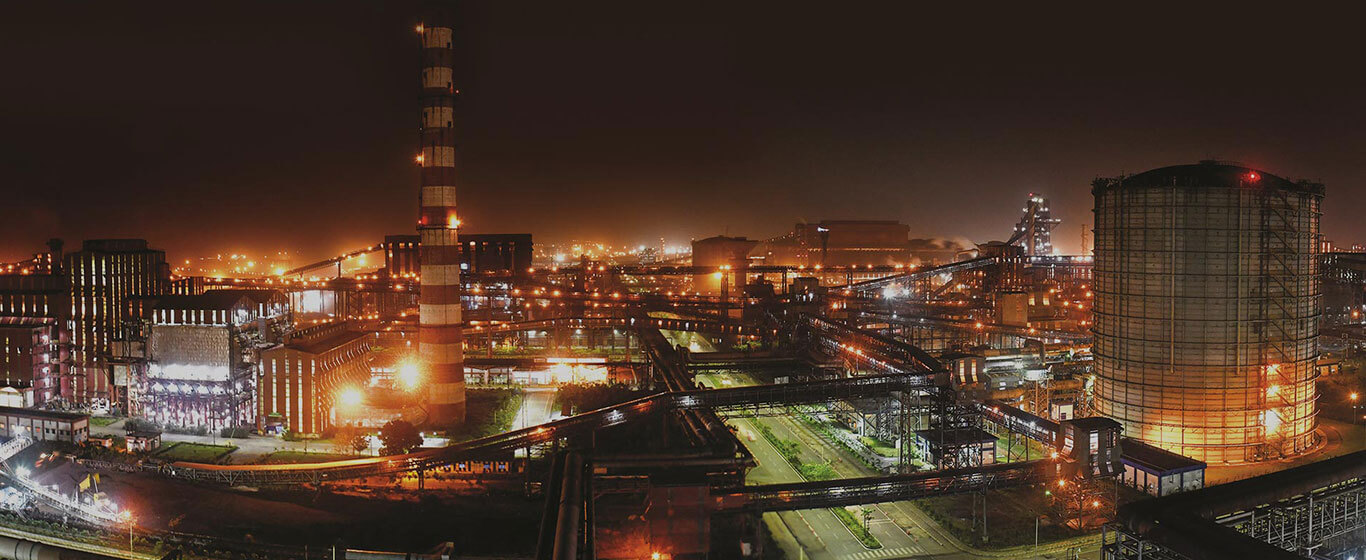Behind every box-office hit film is a great script, backed by powerful real-life action. Tata Steel Limited (TSL) has been on a multi-year digital enabled business transformation journey intending to be the leader in ‘Digital Steel making by 2025’, through adoption of digital technologies. In the process, TSL intends to generate an EBIDTA improvement of US$ 2 bn, enhance its digital maturity, and change its work practices so as to be more insightful and intelligent as an organization. Of the above, over the last couple of years, various digital projects have already been implemented across the organization leading to an EBIDTA savings of around US$ 250 mn and a potential line of sight of US$ 1 bn. Cloud, Data and AI are the key pillars propping up integrated business insight platforms driving connectedness of assets, stakeholders and processes.
Strong Foundation
Since the early stages of its ensuing transformation, TSL believed that Digital is just an enabler to achieve business objectives. The first step was to build a belief system in the top management on the value Digital could bring to the business. TSL launched the Reverse Mentoring Programme (later recognized as an Industry Best Practice by the WEF) where 16 people under 30 years of age were selected to mentor members of the senior leadership, including the MD. It was followed up with the Digital Darshan Programme where ‘go and see’ visits were made by the mentors and the mentees, and a Digital Immersion Programme which involved learning missions with other digital native companies, including site visits to USA and Europe. These helped cement the need for incorporating Digital into the business fabric of the company.
"We aspire to be an industry leader in leveraging digital technologies across our entire value chain, and our investments towards it with a business first approach have been more than remunerative….As we settle into the new ways of working, we want to explore the frontiers of technology to enable more offsite work than onsite, even in our manufacturing functions.”
—Mr TV Narendran
Global CEO & MD, Tata Steel
Scripting the Digital Journey
To enable the ‘tomorrow’ envisioned by TSL, we took an approach to drive change on three fronts – Process & Governance, People, and Technology.
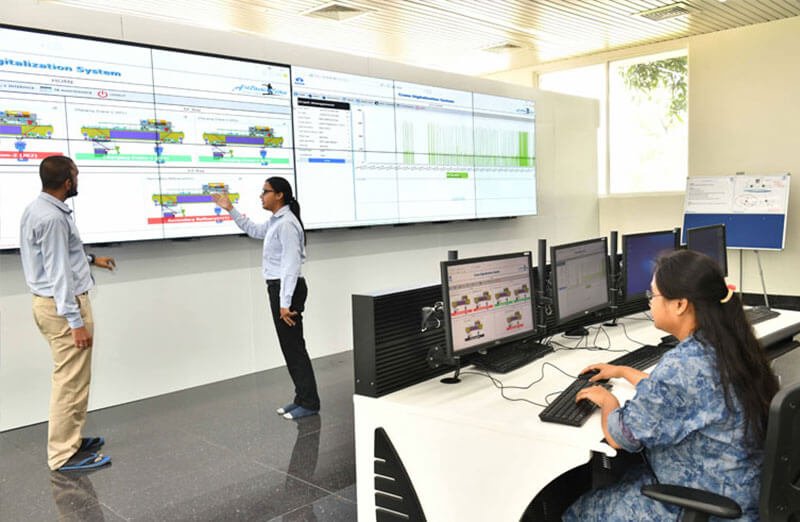
Process & Governance
TSL firmly believes that meaningful sustainable changes are underpinned by a change in the ways of working within the company.
Prior to 2018, three teams – Automation, Digital Value Acceleration Team, and IT Services - were individually driving the digital agenda. To drive Synergy, Simplicity, Scale, and Speed, TSL restructured and brought these teams together to form ‘One IT’ in January 2018 to magnify the impact and avoid duplicity of resources.
In line with the industry best practices, internal Client Partner (CP) roles were created within One IT to work closely with business teams to understand and crystalize business needs into tech solutions. This CP structure, augmented with best-in-class consulting partners, brought about customer centricity and helped energise the entire organisation for the transformation program. Dedicated teams were set-up to address the subsequent stages of the Customer Lifecycle Journey. Projects and ‘Run’ teams were set up to ensure timely service delivery and keep the systems (level 2 and upwards) up and running in the regular course of business.
To identify business value pools, prioritize initiatives, and to drive the business-first approach, the well-entrenched Shikhar25 program was leveraged. Launched in FY16, Shikar 25 aims to achieve benchmark levels while building institutional capability. The initiative identifies and accelerates improvements in projects related to operational excellence across the value chain. The existing governance structures and processes ensured that there was equal rigour as well as management timeshare on the ensuing transformation with a dedicated team focussing exclusively on digital projects under the broader Shikhar umbrella.
People
Having already built the awareness among and impressed the need for adopting Digital in the senior leadership, it was now necessary to convert it into a people led transformation. A 3-pronged approach was adopted to make it happen – Awareness, General Capabilities, and Deep Tech Capabilities.
To build awareness, TSL used mass communication techniques to reach out to everyone in the organisation. It used ‘leadership-speak’ videos to align employees with the management’s vision. Flash cards and comic strips were used to drive the awareness on multiple initiatives using multiple digital tools.
General tech capabilities were built through the ‘Digital for All’ programme. Around 5 hours of online, self-paced course content was developed with the objective to increase the digital awareness for all employees.
TSL has set up Centres of Excellence (COE) ….. for a structured learning journey with theoretical and practical inputs, assessments and action learning projects with 3 expertise levels (Basic, Intermediate, Advanced).
Over 11K employees were trained, both blue-collared and white-collared, in subjects such as Mobility, social media, Cloud, IoT, etc., using online modules.
To build deep tech capabilities, TSL has set up Centres of Excellence (COE) in the domains of Analytics/ Data Science, Visualisation, Internet of Things (IoT), Robotic Process Automation and Blockchain, DevSecOps, Cloud Nativity in the pipeline. These COEs set up a structured learning journey with theoretical and practical inputs, assessments and action learning projects with 3 expertise levels (Basic, Intermediate and Advanced) to help the organisation develop ‘Digital Citizens’ with enhanced productivity and ‘Citizen Data Scientists’ to embed a culture of data driven decision making in the business. Capability building has been further institutionalised through collaborations and tie-ups with partners such as Indian Statistical Institute Kolkata, UpGrad, and SkillSoft.
Technology
TSL believes in the philosophy of “building roads before making cars” and hence, focussed on augmenting its network, cloud and cyber-security. It adapted a 7-layer Industry 4.0 Architecture [as in the image below] to deliver scaled, agile and sustainable business transformation. It made progressively substantial investments in Network augmentation, Cybersecurity, Cyber risk identification, Enterprise Cloud, Smart Sensorization and Analytics platforms. The architecture follows a ‘centralized/decentralized’ approach, where the infra and data platforms are centralized while the insights platforms are customized to specific business needs. This allows better control & governance, agility, uniformity and cost effectiveness in provisioning of IT services, while allowing the flexibility to meet the needs to of the various business functions across the value chain, reflecting a ’Design Global, Deliver Local’ approach.
In parallel, TSL also embarked on a journey to develop a Maintenance Technology Roadmap (MTR) across its operating and mining locations.
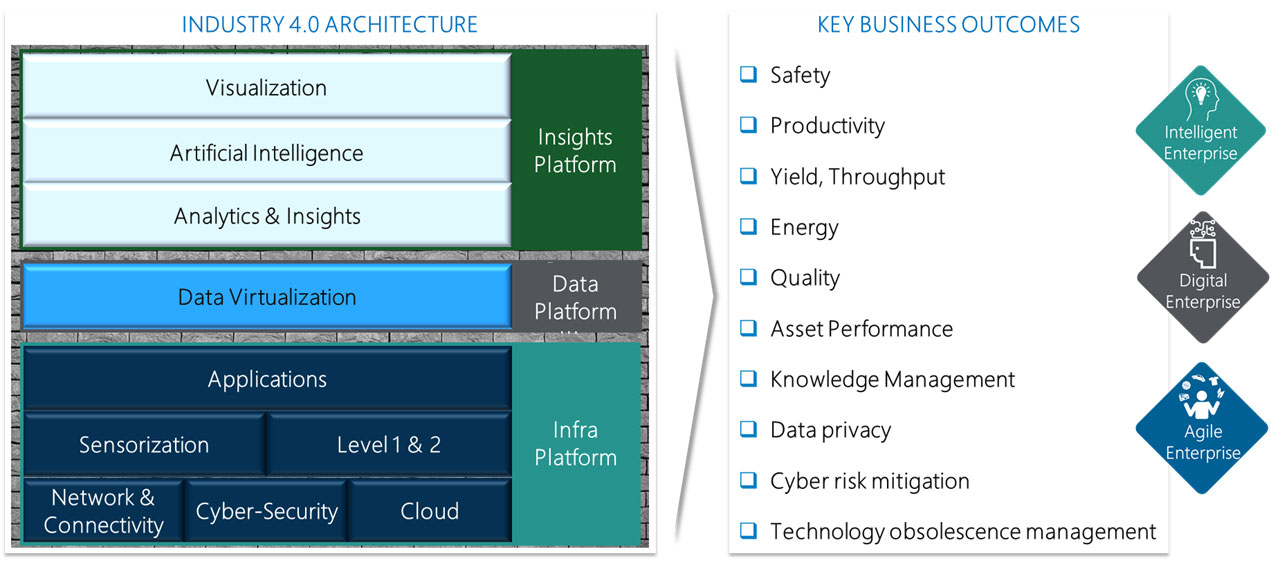
It helped identify sensorization needs that would enable predictive maintenance for mission critical equipment. Asset Monitoring & Diagnostic Centre (AMDC) and Digital Asset Management System (DAMS) have also been set up at Jamshedpur and Kalinganagar locations respectively. These allow remote monitoring of such critical equipment and processes, and initiate preventive maintenance when required.
Today, TSL has been able to ensure business system availability with an up time of 99.9% (a vector product of Network, Compute, and Application Availability) allowing it to manage services across India – from metro cities with high-speed internet connectivity to remote located mines with limited infrastructure.
In its digitalization journey, TSL has also engaged with the best-of-breed partners across technology and consulting domains. It also actively engages with the vibrant start-up ecosystem in India to leverage their expertise in deep tech for capability augmentation and development agility.
Cognitive Enterprise
At Tata Steel, it is believed that a Cognitive Enterprise is one which is Agile, Digital & Intelligent. The level of cognitive awareness today is very different than what it was in the past. The method of cognition in the decision-making process is undergoing a transformation enabled by the various digital technologies – Industrial Internet of Things (IOT), Smart Sensors, Artificial Intelligence, Natural Language Processing, and Cloud Computing.
All these initiatives have accelerated data generation to 100 TB/month and a growth of approx. 2x in data volumes. 800+ data visualization dashboards for consumption and 150+ advanced analytics models have been deployed across processes to drive insights-based decision making. TSL is now focusing primarily on the data as a precursor to deeper AI. Two simple metrics are being pursued to take the journey forward - effectiveness of data usage (measured by Value per TB of data) and efficiency of data (measured by Cost per TB of data).
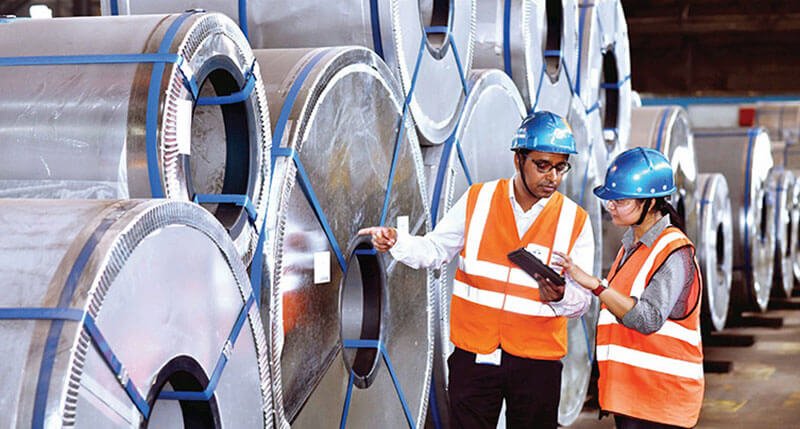
TSL has been successfully driving change across 3 key themes – Connected Assets, Connected Processes, and Connected Stakeholders.
In TSL’s ‘Business First’ approach to AI, use cases have been identified where AI is driving clear tangible business benefits. For example:
- using data analytics to arrive at the optimum quality of coke, pellet and sinter; and quantity of input to improve yield and throughput of the blast furnaces;
- modelling the iron making process inside a blast furnace, using advanced analytics. This allowed TSL to reduce coke consumption and further enhance yield;
- guiding TSL’s operators on the optimum casting speed in the continuous casting process to arrive at the target properties at the lowest cost and time, using advanced analytics models;
- optimizing TSL’s logistics cost and improving yield by efficient production planning by deploying Operations Research based models.
All such initiatives are governed and rigorously monitored with the target to gain 10-15% cost improvements through better yield and speed.
Business Platforms
Since 2020, the focus of digital enabled business transformation has shifted towards business platforms that would enable process efficiencies.
TSL has been successfully driving change across 3 key themes – Connected Assets, Connected Processes, and Connected Stakeholders.
Additionally, Connected Transactions via OTON (One Tata Operating Network) is enabling deployment of Business Process as a Service (BPaaS) in Finance, HR, Procurement and IT Functions.
1. Connected Assets
Through the initiative around Smart Asset Maintenance, TSL strives to achieve higher asset availability at lower maintenance cost, across equipment from mines to rolling mills through enhanced sensorization and building predictive analytics solutions. It is also being used to provide real-time insights on process and equipment to all concerned, from the shop-floor to the top-floor.
- TSL has deployed in-house developed robotic solutions to unload raw materials received in wagons at TSL Kalinganagar and supplemented it with AI to facilitate inspection and alignment of couplers leading to a reduction in the man/machine interface, thereby reducing fatality potential.
- Predictive maintenance has been adopted for 2k+ equipment across 11 equipment families (gear drive, fan, pulley etc.).
2. Connected Processes
Integrated business processes and data from across the value chain for intelligent and optimum decisions as well as 4IR tech aptly substituted capex to meet sustainability and productivity objectives has created a substantial EBITDA impact.
- Integrated Supply Chain Planning & Logistics combined with Integrated Margin Monitor have been taken up as themes & tools to drive end-to-end cost optimization by reducing costs of key raw materials, determine where to produce to deliver greater value for stakeholders and improve customer satisfaction. These initiatives have resulted in a 26% reduction in cost to serve and an EBITDA benefit of Rs. 109cr value accrual in FY 21 by driving Global optima across the value chain.
- When there are no other feasible solutions with better objective function values.
- Procurement 4.0 solutions have enabled 50% reduction in vendor registration cycle time and 20% reduction in PR-PO cycle time resulting in the creation of a $0.6Mn and $25Mn EBITDA impact respectively. Procurement processes are being reimagined by introducing digital catalogue-based buying platform, commodity price prediction aided buying, analytics powered negotiation tools for the Category Managers, end-to-end contract lifecycle management & analytics.
TSL enabled best-in-class stakeholder experience by driving world-class customer experience, zero-harm workplace, enhanced workplace productivity through several technology interventions.
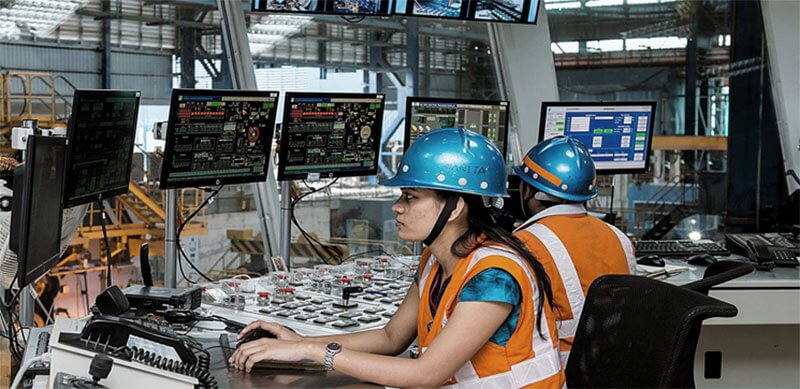
3. Connected Stakeholders
TSL enabled best-in-class stakeholder experience by driving world-class customer experience, zero-harm workplace, enhanced workplace productivity through several technology interventions.
- TSL’s e-commerce platforms Aashiyana (for the individual house builder), DigECA (for the MSME sector), and Compass (for our large industrial accounts) have already proven their worth in the marketplace and are now going to be the main stay of how business is conducted – with minimal in-person interactions and leveraging TSL’s extensive distribution network to deliver products and services. Through Aashiyana TSL has been able to clock a turnover of Rs ~415 Crs in the last two years.
- Satellite image & socio-economic data analytics for demand estimation of certain product segments. This solution is now going to prove essential in the era of social distancing where we can identify demand hotspot remotely and direct sales efforts towards it.
- TSL installed 18K Beacons installed across the plant enabling 100% near-real time visibility of 34k workers through the custom built Connected Workforce Platform helping track safety, productivity & fix commercial leakage.
- TSL had taken the unique initiative in FY’ 20 (Suraksha Card) to track the contract workforce working inside factory premises and mines spanning across various geographies on near real-time basis to enable its Commitment to Zero (target of zero Loss Time Injuries).
Covid-19 Response
TSL’s digitalisation was well underway when the Covid related pandemic struck. It only reinforced its vision and belief of how businesses of the future will function.
TSL’s investments proved to be a lifesaver as the pandemic set in, by allowing all employees to work from home with a skeletal workforce physically present at the mines & plants to keep the production going, leveraging Anytime, Anywhere Secure Computing. With around 8K employees logging into enterprise applications and around 3.5K virtual meetings taking place each day, this has been a real challenge for the TSL technology applications.
Even before the pandemic struck, TSL had already deployed a Connected Workforce platform to monitor contract workers inside the plant premises to proactively address health and safety hazards. TSL horizontally deployed the same platform to sense a large group of people in any section of the workplace through its Crowd Sensing solution to pre-empt and detect violation of social distancing on the shop floors, canteens and on roads. Camera feeds were used to identify people without face coverings through an AI based Face Mask Detection solution. A mandatory Covid-19 related travel declaration was collated, basis which a 45-day contact tracing was carried out if any contract worker was found Covid-19 positive.
Today Suraksha Scanners are empowering security personnel at entry gates scan RFID cards through smart phones and extract relevant information on travel declaration and compliance of its contract workmen, thereby preventing high risk people from entering the TSL premises.
Through TSL’s Containment Management solution, it is identifying personnel who are stuck in various containment zones and making alternative arrangements during their absence.
TSL continues to be an outstanding corporate citizen by continuing the same set-up for Covid-19 response reactivation. It is using all the tools that were created and adding some more as it tracks employee vaccination to fight the pandemic.
Recognition
TSL has embedded the ethos of transformation in its culture and created scalable processes, technologies and platforms, which can be deployed at low cost across the organisation’s expanse, thereby enabling TSL to become a World Economic Forum Industry 4.0 Lighthouse creating machine.
The World Economic Forum has identified TSL Ijmuiden (Netherland) in 2018, TSL Kalinganagar (India) in 2019, and Tata Steel Jamshedpur (India) in 2021 as global lighthouse sites for adoption of Industry 4.0. As of March 2021, among the 69 globally recognized lighthouses, there are 5 from the steel industry wherein TSL is the proud owner of 3. It is also worth noting that TSK is one of the youngest, having reached this distinction within the first 3 years of its inception, while TSJ one of the oldest lighthouses to join the network.
In addition, Gartner’s CIO Survey report, ranked TSL as a “Top Performer” in the foremost 6% of the 1800+ leading global organisations for its Covid-19 response. Gartner also recognised TSL to be of “Refined” digital maturity in its Digital Execution Scorecard assessment.
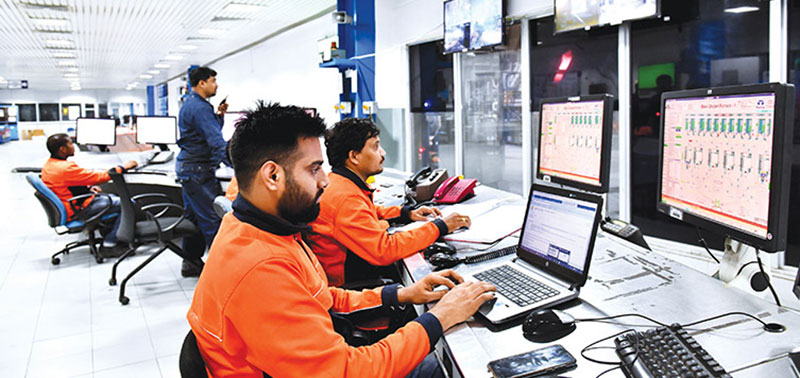
The Way Forward
Of the 3-phased journey that TSL has undertaken, the first two phases – Cloud and Data Reading capabilities are well underway.
Going into the future, TSL will leverage Artificial Intelligence capabilities to drive business process autonomy and hyper-personalisation, along with ‘Write Capabilities’ (Phase 3). Today, Tata Steel has only a ‘remote’ view of the assets and processes. For example, one can remotely see the functioning of the blast furnace but cannot carry out any corrective actions remotely. To do so, someone still needs to physically go to the plant and take the necessary actions. The endgame, as Tata Steel envisages it, is to control the entire plant remotely through virtual command centres, progressively moving from near-site to far-site operations. As part of TSL’s digital readiness, it now has a transformation template comprising of multiple frameworks that have been tested, borne results and are being horizontally deployed to other TSL Group companies for an accelerated transformation
Over the years, the company has enhanced every aspect of its business through digital interventions, working towards a zero-harm workplace, customer centricity, process efficiency, asset reliability, financial alacrity, environment sustainability and community development. The use of Digital across the value chain is reinforcing the organisational resilience and steadily transforming TSL from a process & review driven organisation to a data & insights driven organisation. Data as a single version of truth with insights at the point of decision making will define the Tata Steel of tomorrow. The results yielded by TSL’s methods have only reinforced the leadership driven, business owned, and data backed approach that TSL has been taking to be a global leader in digital steel making by 2025.
ABOUT THE AUTHORS
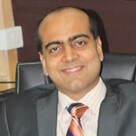
Sarajit Jha is Chief – Business Transformation & Digital Solutions, Tata Steel
Sarajit is involved in partnering with the leadership in evolving the scope and direction of Tata Steel’s digital journey. Strengthening the strategic mindset of Tata Steel and building its digital capabilities are his two key deliverables. He is excited about helping TSL’s journey in fostering agility, bolstering insight generation, innovation and building platforms. An officer of the Tata Administrative Service (TAS), Sarajit has worked with Tata BSS, Tata Global Beverages and Tata Steel Ltd, over the last 2 decades. Sarajit is the founder and current Chair of DX 50 – India’s only Chief Digital Officer organization. He is also the convenor of Confederation of Indian Industry (CII) – ICTE forum for Jharkhand. The National Council for Development nominated Sarajit for its prestigious Bharat Gaurav award in 2008. He also represented India in the Thora renewal program in Malaysia.

Piyush Agarwal is Manager – Business Transformation Solutions, Tata Steel
Piyush is involved in conceptualising and driving cutting edge projects across functions. He is excited about helping TSL make Digital a cornerstone of the way business is done. An officer of the Tata Administrative Service (TAS), Piyush has worked with Tata Industries, Tata Motors, Tata International. and Tata Steel Ltd, over the last 4 years after completing his PGP in Management from IIM-Ahmedabad





